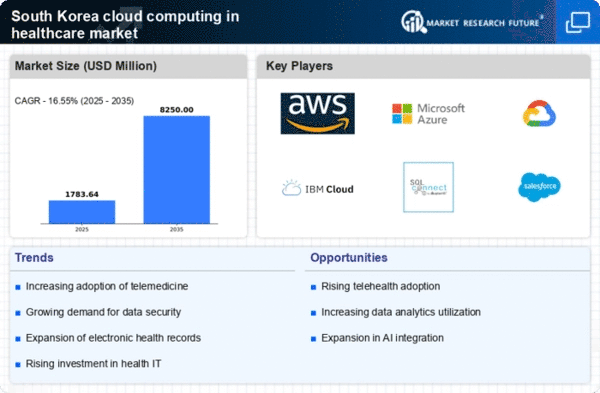Government Initiatives and Support
The South Korean government plays a pivotal role in fostering the cloud computing-in-healthcare market through various initiatives and support programs. Policies aimed at promoting digital transformation in healthcare are being implemented, which include funding for cloud infrastructure development and incentives for healthcare providers to adopt cloud solutions. The government has allocated approximately $200 million to enhance digital health services, which is expected to significantly boost the adoption of cloud technologies in healthcare settings. Furthermore, regulatory frameworks are being established to ensure compliance and security in cloud-based healthcare applications. This supportive environment encourages innovation and investment in the cloud computing sector, ultimately leading to improved healthcare delivery and patient outcomes.
Enhanced Data Analytics Capabilities
The cloud computing-in-healthcare market is significantly influenced by the enhanced data analytics capabilities that cloud solutions offer. With the increasing volume of healthcare data generated daily, the ability to analyze this data effectively is paramount. Cloud platforms provide advanced analytics tools that enable healthcare providers to derive actionable insights from patient data, leading to improved clinical decision-making. In South Korea, the market for healthcare analytics is expected to reach $1 billion by 2026, reflecting the growing recognition of data-driven strategies in healthcare. These analytics capabilities facilitate predictive modeling, population health management, and personalized medicine, ultimately enhancing patient outcomes and operational efficiency within healthcare organizations.
Growing Focus on Patient-Centric Care
The cloud computing-in-healthcare market is witnessing a growing focus on patient-centric care, which is reshaping how healthcare services are delivered. This shift emphasizes the importance of tailoring healthcare solutions to meet individual patient needs and preferences. Cloud technologies enable healthcare providers to access comprehensive patient data, facilitating personalized treatment plans and improved patient engagement. In South Korea, the trend towards patient-centric care is supported by the increasing use of mobile health applications and telehealth services, which are often powered by cloud infrastructure. As patients become more involved in their healthcare journeys, the demand for cloud-based solutions that support this engagement is likely to rise, further driving the growth of the cloud computing-in-healthcare market.
Cost Efficiency and Resource Optimization
Cost efficiency is a critical driver for the cloud computing-in-healthcare market in South Korea. Healthcare organizations are increasingly recognizing the financial benefits of transitioning to cloud-based solutions. By leveraging cloud technology, hospitals and clinics can reduce their IT infrastructure costs, as they no longer need to invest heavily in on-premises hardware and software. Studies indicate that organizations can save up to 30% on IT expenditures by adopting cloud services. Additionally, cloud computing enables better resource optimization, allowing healthcare providers to allocate their resources more effectively. This shift not only enhances operational efficiency but also allows for the reallocation of funds towards patient care and innovative treatments, thereby improving overall healthcare quality.
Rising Demand for Remote Patient Monitoring
The cloud computing-in-healthcare market in South Korea is experiencing a notable surge in demand for remote patient monitoring solutions. This trend is driven by the increasing prevalence of chronic diseases and the need for continuous health management. As healthcare providers seek to enhance patient engagement and improve outcomes, cloud-based platforms facilitate real-time data collection and analysis. According to recent statistics, the remote patient monitoring segment is projected to grow at a CAGR of approximately 25% over the next five years. This growth indicates a strong shift towards proactive healthcare management, where patients can be monitored from the comfort of their homes, thereby reducing hospital visits and associated costs. The integration of cloud technology allows for seamless data sharing among healthcare professionals, ultimately leading to more informed decision-making and personalized care.
















